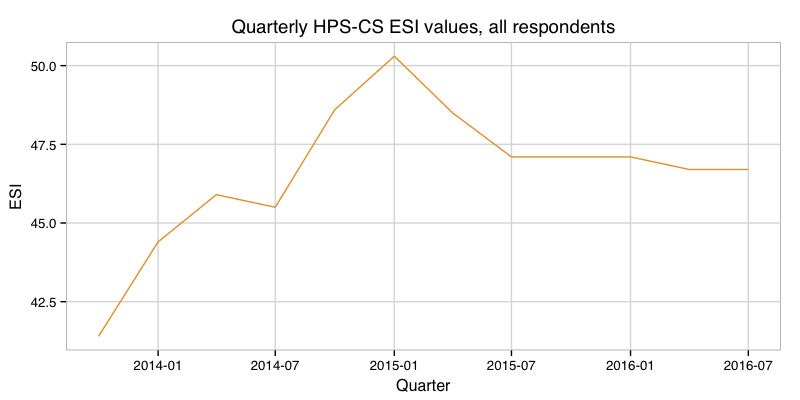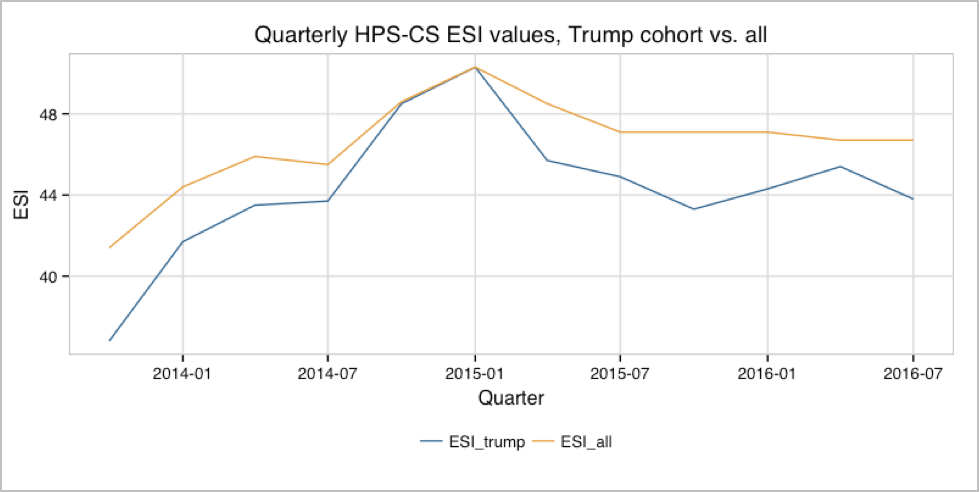No matter where you fall on the political spectrum, nobody – and I mean nobody – saw the Donald Trump train coming. Some of the smartest academic, political, and business minds I know are still in complete disbelief. The media is beside itself. The leaders of the Republican Party paraded 16 establishment candidates in front of voters and they whiffed on every one. Hillary Clinton and her aides must wake up in cold sweats every night, wondering why they’re forced to share a debate stage with a candidate whose number of flaws has as many commas in it as his bank balance.
Nobody anticipated the Donald Trump phenomenon. But we could have – and should have. We just didn’t know where to look or how to listen.
Since 2011, CivicScience has tracked “economic sentiment” in the U.S. on a daily basis, aimed at measuring Americans’ views on their personal financial situation, their outlook, the job market, housing market, and a litany of other related factors. The metrics we derive from our Economic Sentiment Index provide a reliable read on the economic climate and America’s mood in general. Take a look at how U.S. adults felt about the economy over the past 30 months:
 Overall, the numbers have improved slightly during the past two years with a significant spike toward the end of 2014, owed largely to the precipitous drop in fuel prices during that period.
Overall, the numbers have improved slightly during the past two years with a significant spike toward the end of 2014, owed largely to the precipitous drop in fuel prices during that period.
But look what happens when we isolate the group of Americans we define as the “Trump Cohort” (the blue line) – primarily white, lower-middle to middle class, rural and suburban, Republican men:
 Going back to the end of 2013, the Trump Cohort has demonstrated decidedly lower enthusiasm for the U.S. economy than the population at large (with the exception of that brief fuel-price anomaly at the end of 2014). They’ve consistently expressed weaker views of the job market, the current U.S. economy, and their prospects for the future. Only when it came to the housing market did this group consistently have a more positive opinion than average.
Going back to the end of 2013, the Trump Cohort has demonstrated decidedly lower enthusiasm for the U.S. economy than the population at large (with the exception of that brief fuel-price anomaly at the end of 2014). They’ve consistently expressed weaker views of the job market, the current U.S. economy, and their prospects for the future. Only when it came to the housing market did this group consistently have a more positive opinion than average.
Take note of the spike in the blue line during the late spring of this year. We can’t prove causality with 100% confidence but it’s probably more than a coincidence that a certain political candidate emerged from the Republican primary about that time. Trump gave these people hope, while the general population became less positive.
The Trump Cohort is a relatively quiet group of people, a few outspoken outliers aside. On average, they’re less likely to be active users of Facebook or Twitter and much less likely than their liberal counterparts to engage in political debate on those platforms. Because they weren’t screaming through their social media bullhorns, nobody had a clue how pissed off they were. We convinced ourselves that our angry Republican friends were outliers – a group not to be taken seriously, if only because they were so few. Oops.
Quick Public Service Announcement: Stop thinking that social media is a thorough and representative view of public opinion. It’s not. Not even close.
I will also pause here to say that I’m a lifelong Republican – a registered one anyway. When I was 22, I worked for Rick Santorum during his first U.S. Senate term, when his agenda centered on things like Welfare Reform, balancing the budget, and tech-based economic development. For years, most of my passwords were some derivative of Ronald Reagan’s name. I believe that government should only get involved in our lives when all other avenues fail. My GOP credentials are legit.
So I can say, with some credibility, that Republicans need to stop blaming Barack Obama or Hillary Clinton for the current state of things and start blaming themselves. The GOP helped to create the Congressional redistricting system we have today, where only the most-right-leaning members of the party – and career political insiders – can win. Most people in the Trump Cohort aren’t obsessed with religion, abortion, or deficits. They’re worried about their jobs, their incomes, and their liberties. But Republicans were too busy worrying about same sex marriage, gender-specific bathrooms, and preserving the establishment to realize what was happening right under their nose.








